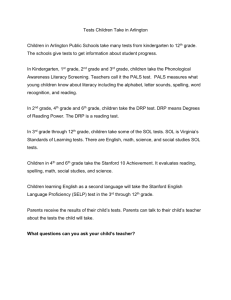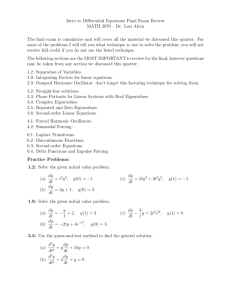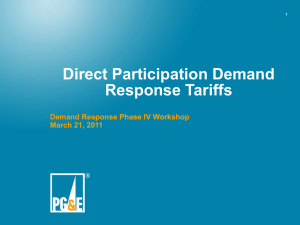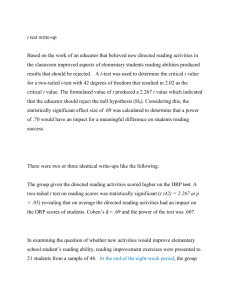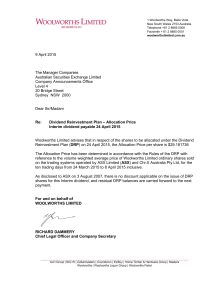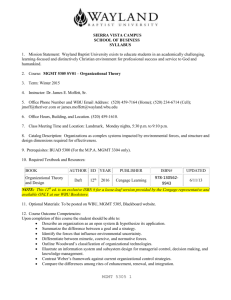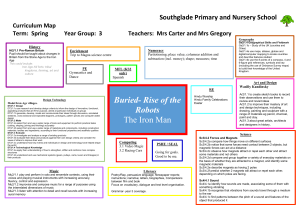WAYLAND BAPTIST UNIVERSITY
advertisement
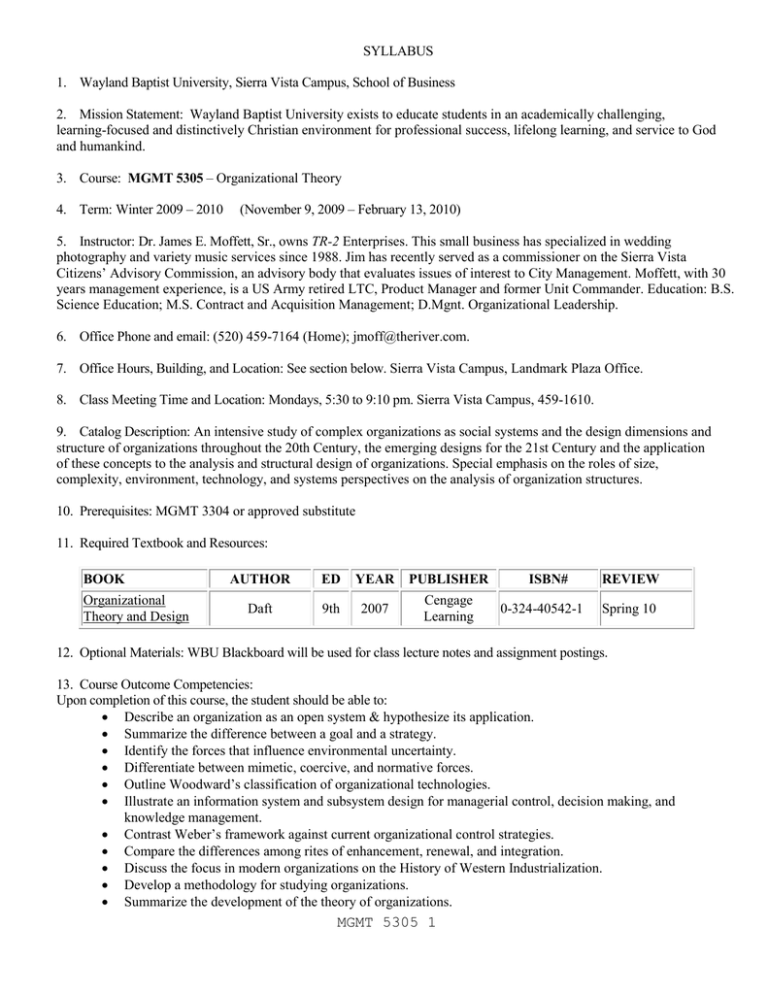
SYLLABUS 1. Wayland Baptist University, Sierra Vista Campus, School of Business 2. Mission Statement: Wayland Baptist University exists to educate students in an academically challenging, learning-focused and distinctively Christian environment for professional success, lifelong learning, and service to God and humankind. 3. Course: MGMT 5305 – Organizational Theory 4. Term: Winter 2009 – 2010 (November 9, 2009 – February 13, 2010) 5. Instructor: Dr. James E. Moffett, Sr., owns TR-2 Enterprises. This small business has specialized in wedding photography and variety music services since 1988. Jim has recently served as a commissioner on the Sierra Vista Citizens’ Advisory Commission, an advisory body that evaluates issues of interest to City Management. Moffett, with 30 years management experience, is a US Army retired LTC, Product Manager and former Unit Commander. Education: B.S. Science Education; M.S. Contract and Acquisition Management; D.Mgnt. Organizational Leadership. 6. Office Phone and email: (520) 459-7164 (Home); jmoff@theriver.com. 7. Office Hours, Building, and Location: See section below. Sierra Vista Campus, Landmark Plaza Office. 8. Class Meeting Time and Location: Mondays, 5:30 to 9:10 pm. Sierra Vista Campus, 459-1610. 9. Catalog Description: An intensive study of complex organizations as social systems and the design dimensions and structure of organizations throughout the 20th Century, the emerging designs for the 21st Century and the application of these concepts to the analysis and structural design of organizations. Special emphasis on the roles of size, complexity, environment, technology, and systems perspectives on the analysis of organization structures. 10. Prerequisites: MGMT 3304 or approved substitute 11. Required Textbook and Resources: BOOK Organizational Theory and Design AUTHOR ED YEAR PUBLISHER Daft 9th 2007 Cengage Learning ISBN# 0-324-40542-1 REVIEW Spring 10 12. Optional Materials: WBU Blackboard will be used for class lecture notes and assignment postings. 13. Course Outcome Competencies: Upon completion of this course, the student should be able to: Describe an organization as an open system & hypothesize its application. Summarize the difference between a goal and a strategy. Identify the forces that influence environmental uncertainty. Differentiate between mimetic, coercive, and normative forces. Outline Woodward’s classification of organizational technologies. Illustrate an information system and subsystem design for managerial control, decision making, and knowledge management. Contrast Weber’s framework against current organizational control strategies. Compare the differences among rites of enhancement, renewal, and integration. Discuss the focus in modern organizations on the History of Western Industrialization. Develop a methodology for studying organizations. Summarize the development of the theory of organizations. MGMT 5305 1 Summarize how designing the organization to fit strategy and other contingencies can lead to organization effectiveness. Compare the five approaches for assessing organization effectiveness. Discuss the interface of design components, coupling, and technology. Using levels of analysis, explain the systemic relationship between environment, adaptation, and change. Differentiate between the stages of organizational life cycle development in relation to growth, development, and decline. Compare the different decision-making process models with the contingency framework. Rank the impact of globalization on the future of organizations and their design. Identify the five structural strategies for grouping organizational activities. Describe the symptoms of structural deficiency. Explain the institutional view in relation to organizational design and similarity. 14. Attendance Requirements: All absences must be explained to the instructor, who will determine whether omitted work may be made up. If allowed, the late penalty applies. When a student has absences in accordance with WBU policy, the instructor will advise the student and file an unsatisfactory progress/attendance report with the campus dean. Any student that misses more than 2.75 classes will receive a grade of F, per WBU memo dated 5/27/09. 15. Disability Statement: “In compliance with the Americans with Disabilities Act of 1990 (ADA), it is the policy of Wayland Baptist University that no otherwise qualified person with a disability be excluded from participation in, be denied the benefits of, or be subject to discrimination under any educational program or activity in the university. The Coordinator of Counseling Services serves as the coordinator of students with a disability and should be contacted concerning accommodation requests at (806) 291- 3765. Documentation of a disability must accompany any request for accommodations.” 16: Course Requirements and Grading Criteria: 17. Tentative Schedule: Calendar, Topics, Assignments. See below. 18. Additional information. 19. Proctor Hours: No proctors are available on dates that the offices are closed. Please arrive early enough to complete the exam prior to the close of business. Test proctoring is available on the final Saturday of the term, February 13, 2010, from 8am until 2pm at the Landmark office only. Landmark Office: Fort Huachuca Office: Monday – Wednesday 8 AM – 9 PM Thursday 10 AM – 9 PM Friday 8 AM – NOON Monday – Wednesday 8 AM – 5 PM Thursday 10:30 AM – 5 PM Friday 8 AM – NOON 20. Student Family Members: Family members of WBU students, particularly small children, may not accompany the learner to class. 21. Late Assignments: Assignments are late if submitted after 9:10 p.m. on the due date. Late assignments receive a four (4)-point penalty. 22. Acceptable Web Sites: Four types of websites will be accepted as source citations: government (i.e., US, State, local, etc.), academic (i.e., WBU and other libraries), companies and corporations (i.e., IBM, Raytheon, etc.), and organizations (i.e., Ethics.org; AMAnet.org, etc.). General-use sites, such as Wikipedia and Google are not accepted because of much unsubstantiated information and questionable authorships. However, Google Scholar is permitted. MGMT 5305 2 23. Writing and Documentation: Grammatically accurate writing is paramount. A paper’s content is difficult to comprehend when there are numerous grammatical and documentation shortcomings. Students may receive writing assistance from the recently published WBU writing guide, any other writing style guide, and the American Psychological Association (APA) refresher at www.apa.org. In this course, the intent is to motivate students to elevate their writing skills to the next level of academic excellence. Graduate students are expected to know and apply APA documentation. COURSE REQUIREMENTS: 24. Reading Assignments: Each week you are required to read information indicated in the course outline below. Course reading is in accordance with the below week-by-week topics. Be prepared to discuss the concepts in class. 25. Homework Assignments: There are a series of homework assignments that result in development of a professional Organizational Theory and the Organization (OTO) Plan. 26. Participation: This course includes verbal participation in class exercises, activities, and contributions to class discussions. Overall course participation equates to the assigned points. The student must be present and actively involved to receive these points. The student may not make up these points. 27. Define and Relate Papers (DRP): Understanding the concepts is demonstrated through a series of DRP’s. In these 3 to 4 page, double-spaced, APA papers, the student must define the operative concept(s) and discuss them in relation to his or her organization. Organizational theory (OT) Worksheet findings, if applicable, should be incorporated into the DRP. Students should expect impromptu DRP discussions. DRP’s consist of: a title page, thesis statement, discussion, conclusion, reference page, and APA Level 1 and 3 headings are mandatory. PowerPoint presentations should consist of a minimal quantity of slides that address the applicable OTO concepts. Citations and a reference list are required. 28. Organizational Theory and the Organization (OTO) Plan Outline I. II. III. IV. V. VI. VII. VIII. IX. X. XI. OTO Thesis Statement . . . . . Dimensions of Organizations . . . . Open System versus Closed Systems . . . Goals and Strategies . . . . . Mimetic, Coercive, and Normative Forces . . Woodward’s classification of organizational technologies. Enact and Enactment . . . . . Decision-making Special Circumstances . . . Conclusion . . . . . . References . . . . . . Appendices (OT Worksheets) . . . . Basic format of OTO Plan discussion: A) B) C) D) Define the concept. Relate the concept to an organization, preferably your organization. Include your OT Worksheet findings, if applicable. How might the concept improve the organization? MGMT 5305 3 . . . . . . . . . . . Page Number . . . . . . . . . . . . . . . . . . . . . . 29. Assignments Due Dates Class 1. Introductions, Syllabus, Fundamental Definitions, and Discussions. Class 3. Open versus Closed System DRP Part. Points 0 Readings 1 As required Nov 16 5 PwrPt. 1 No class 11/23/09 Nov 30 10 DRP/5 PwrPt. 1 As required Nov 9 Class 2. Dimensions of Organizations Pts. As required Class 4. Goals and Strategies Dec 7 0 1 As required Class 5. Goals and Strategies DRP Dec 14 10 DRP 1 As required 0 1 As required 10 DRP/5 PwrPt. 1 As required 0 1 As required 0 1 As required 10 DRP/5 PwrPt. 1 As required Feb 8 12 DRP 1 5 Final OTO Plan 12 Exam As required Total 89 Class 6. Mimetic, Coercive, and Normative Forces Jan 4 Class 7. Mimetic, Coercive, and Normative Forces DRP Jan 11 Class 8. Woodward’s Classification of Organizational Jan 18 Technologies Class 9. Decision-making Special Circumstances Jan 25 Class 10. Decision-making Special Circumstances Feb 1 DRP Class 11. Org Structural Strategies DRP Submit Final OTO Plan Final Exam 30. Grading Scale: Letter Grade A B C Point Percentage 90-100 80-89 70-79 Letter Grade D F MGMT 5305 4 plus 11 = 100 points Point Percentage 60-69 59 and below
